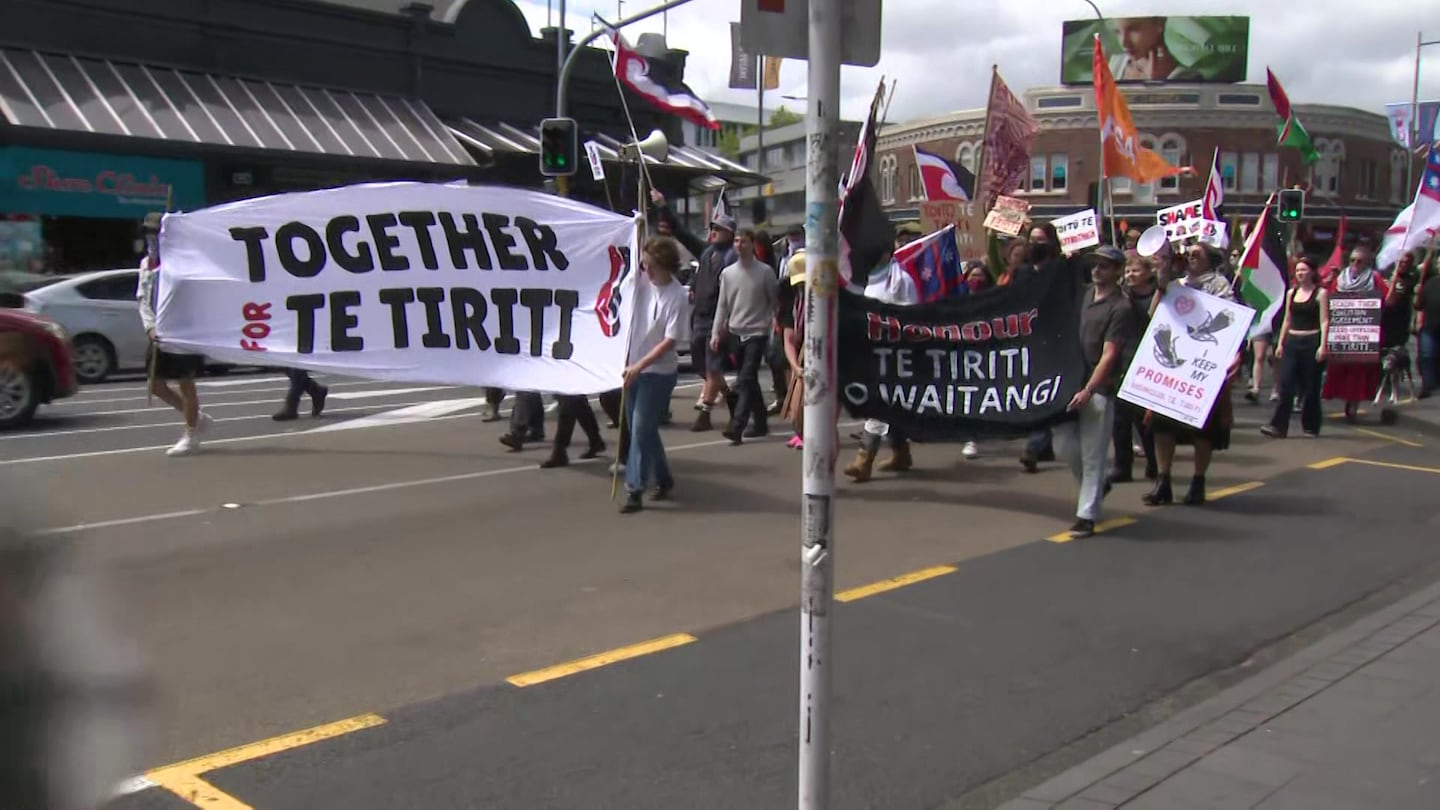“Ake Ake Ake” rang through the streets of Newmarket this morning as a last-minute protest against David Seymour’s Treaty Principles Bill ground the Auckland suburb to a halt.
The protest is a rapidly organised response to the Act leader’s decision to introduce the bill into Parliament today, well ahead of the scheduled November 18 introduction date.
“Ka whawhai tonu mātou", “Toitū Te Tiriti" and “Honour the Treaty” echoed off the windows of Newmarket’s Broadway as protesters passed the Westfield mall, heading north towards Parnell.
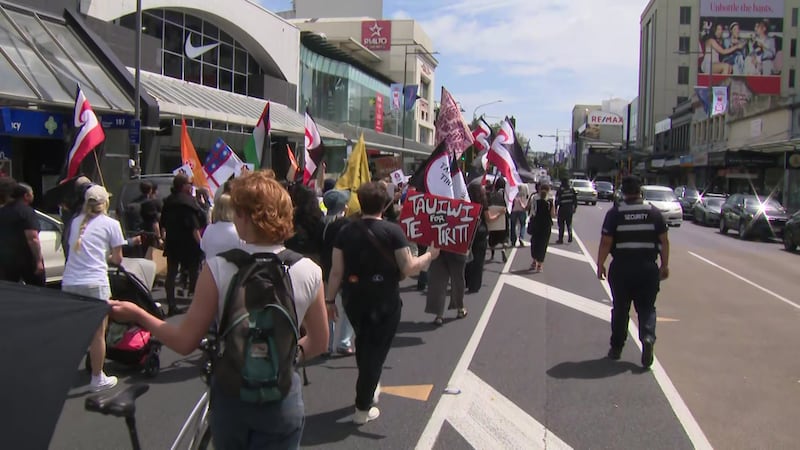
The road is a key route for public transport, near the Newmarket train station and running along the 30 route from the CBD to Onehunga, as well as the 309 and Outer Link route, and the 70 route from the CBD to Botany.
Earlier today, another small group gathered outside the Beehive mid-morning, holding signs and wearing shirts reading “Kill the Bill.”
Protester Zane Wedding told Te Ao Māori News outside Parliament, that they were there to introduce themselves before the Toitū te Tiriti hīkoi next week.
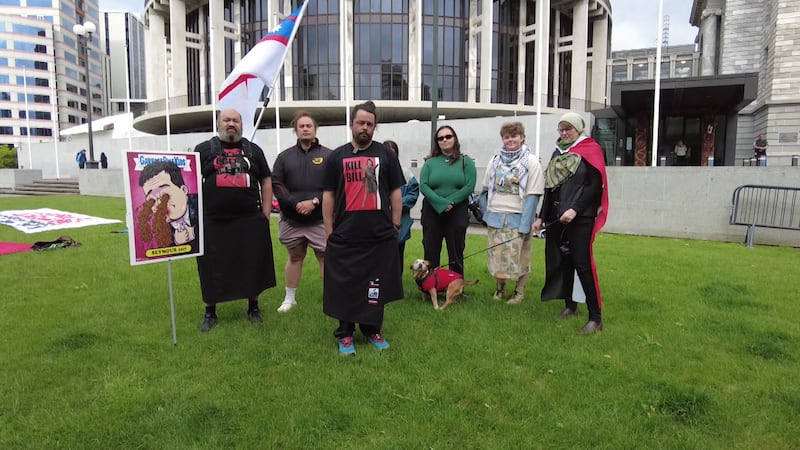
“We know the hīkoi is coming and they [the government] know that too and that’s one of the key reasons they have brought this legislation to be read early.
“That’s the sign of the fear they have for when the people unite and we know that people stand dead against the Treaty Principles Bill. We know that this is an infringement of the right of Māori and all New Zealanders.
“It’s important we show up and we show resistance. They knew we were coming for the reading, they moved it forward, so we moved too.
Wedding said it was important for people to still show up for next week’s hīkoi.
“Pushing this forward has shown that they are afraid, they’re afraid of the power of the people and so that should, for all people, put gas in your tank to show up next week for the hīkoi."
The bill has its first reading next week, when Prime Minister Christopher Luxon will be out of the country.
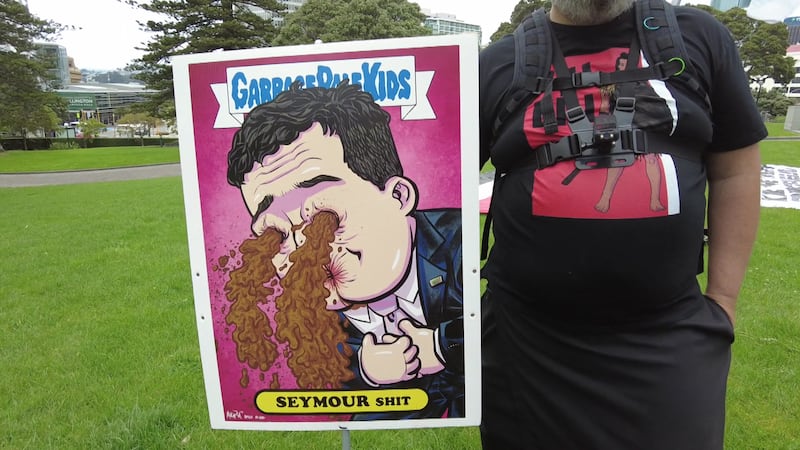
Standing by Wedding’s side was artist Michel Mulipola aka Bloody Samoan holding a sign with a drawing of Seymour’s eyes spewing faeces.
“It’s often flowing out his mouth whenever he starts talking but this artwork was shared all over social media, it went viral, it was shared by Māori Labour MP Peeni Henare on social media.”
RNZ reported Seymour said the bill being pushed forward happened many times in government.
“This is happening all the time as people get policy decisions, get papers through the cabinet, to get time in the House and so on. There’s a lot of reasons why introduction times for bills move so frequently.
“They [the Waitangi Tribunal] asked for a date, we gave them a date, the date changed - and now this idea that it’s been brought forward has become a storyline but is really much ado about nothing.”
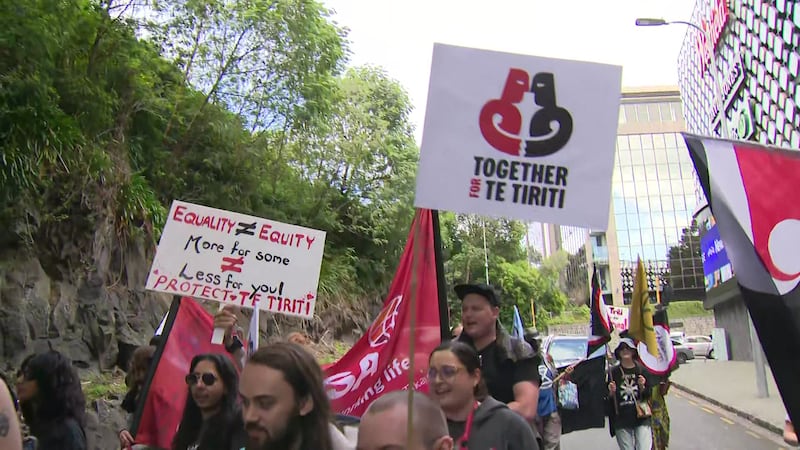
The government bill was part of National and Act‘s coalition deal. Throughout its history, National and New Zealand First have maintained they would not support the bill beyond its first reading.
In August this year, the Waitangi Tribunal submitted its over 200-page interim report on the Treaty Principles Bill and the Treaty clause review to the coalition.
The tribunal has given the Crown four recommendations on its policies made in the coalition agreements between National and Act, and National and the New Zealand First Party.
- It recommended the abandonment of the Treaty Principles Bill policy.
- It recommended that the Crown constitute a cabinet Māori–Crown relations committee to oversee the Crown’s te Tiriti policies. It didn’t find it appropriate that the social outcomes cabinet committee considers these matters.
- It recommended the Treaty clause review policy be put on hold while it is re-conceptualised through collaboration and co-design engagement with Māori.
- It also recommended that the Crown consider a process in partnership with Māori to undo the damage to the Māori–Crown relationship and restore confidence in the honour of the Crown. While it says the issue is wider than the two specific policies before the tribunal in this urgent inquiry, it makes this recommendation based on its findings and the redress necessary to remove the prejudice and prevent similar prejudice in the future.
The report was written after urgent claims were submitted to the tribunal over the coalition government’s potential policies.

